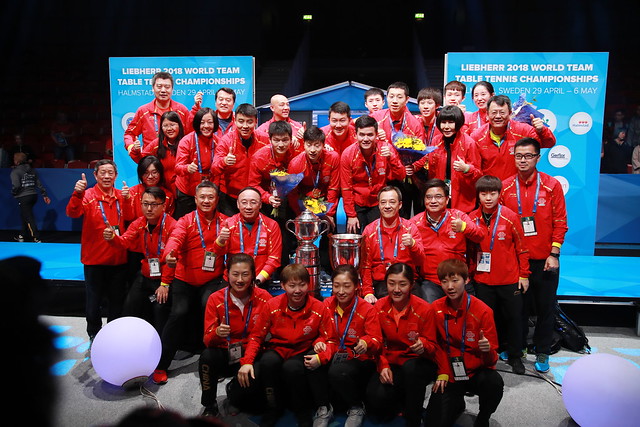by Ian Marshall, ITTF Publications Manager
Both right handed, both shake-hands grip players, both of the highest order but that is where the likeness ends.
Vladimir Samsonov was playing in no less than his 22nd World Championships, only Belgium’s Jean-Michel Saive present in Halmstad but very much in the role of motivator and not a first team selection, has more, he is on duty for the 25th time. Also, Vladimir Samsonov has been ever present since team and individual events were separated, conversely Tomokazu Harimoto was playing in only his second World Championships; his first when the world team is in the title.
A difference in age, a difference in experience; Vladimir Samsonov recently celebrated his 42nd birthday, Tomokazu Harimoto is some two months short of his 15th birthday. All may be significant factors but both seem to have the ability to treat their adversary as player, whatever may be the obvious differences..
However, there is one other most significant difference; it is in their characters. Vladimir Samsonov is quiet, thoughtful in the way he plays; he does not have in his repertoire any of the modern day indiscernible phrases, antics or frolics. Every stroke is played with time to spare, he serves in slow motion.
Tomokazu Harimoto is the exact opposite, win a point and his cries awake the pigeons on the nearby beach; he is hungry, an insatiable appetite for success. He gives all for the cause, his spirit motivates his colleagues; he is busy, active, always in the fast lane. He respects his opponents but he doesn’t fear them.
They are as different as chalk and cheese but they have one vital common factor; in their own ways they are good for the sport of table tennis.
The record books read that Tomokazu Harimoto recovered from a two games to nil deficit to emerge successful against Vladimir Samsonov (9-11, 9-11, 11-6, 12-10, 11-8) and thus gave Japan the early advantage; what the record books do not show is that Tomokazu Harimoto saved one match in the fourth game and trailed 3-8 in the fifth before winning eight points in a row to secure victory!
Now is that not logic turned on its head? You would back the consistency of Vladimir Samsonov when five points clear. On the other hand does that recovery not underline the strong mental attributes of Tomokazu Harimoto?
“In the fourth game when I was losing 9-10 I just thought next point; then at 3-8 down in the fifth it was the same, just take one point at a time; Vladimir Samsonov is so experienced, for me it was important that I played really strongly against him.” Tomokazu Harimoto
A recovery by Tomokazu Harimoto, in the immediately ensuing contest; it was a very similar scenario.
Koki Niwa lost the first two games against Pavel Platonov before winning the next three; when Pavel Platonov won the second game thoughts went through my mind that on another day Belarus, the no.19 seeds could have been two-nil ahead and on the brink of a sensation against the no.3 seeds.
“It’s the first time that I had played Pavel Platonov, I did not really know what to expect. In the first two games I wasn’t able to adjust to the pace of the play; it took me time to find a rhythm.” Koki Niwa
Fightback after fightback, not where Jun Mizutani was concerned; he beat Aliaksandr Khanin in three straight games (11-5, 11-6, 11-9) to conclude matters.









